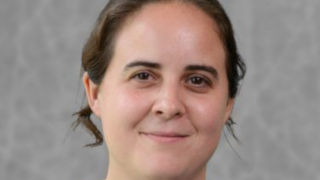Seminar on Chemoselective Reactions for Medicinal Chemistry
Thursday, April 4, 2019

The seminar will be held from 5:45 – 7 p.m. on Tuesday April 9, 2019 in the Helen Lerner Amphitheater, Science and Technology Center, Seton Hall University. Refreshments are available at 5:30 p.m.
Caroline Proulx obtained her Hon. B.Sc. from the University of Ottawa in Biopharmaceutical Sciences (Medicinal Chemistry) in 2007, working under the supervision of Prof. Robert N. Ben. In 2012, she obtained her Ph.D. in Chemistry from the Université de Montréal under the guidance of Professor William D. Lubell, where she worked on the development of methodologies for the combinatorial synthesis of azapeptides. From 2012-2016 she was an NSERC postdoctoral fellow at the Molecular Foundry, Lawrence Berkeley National Laboratory, working with Dr. Ronald N. Zuckermann on peptoid synthesis and self-assembly. She joined the faculty at North Carolina State University in July 2016 as an Assistant Professor, where she develops new tools and synthetic methods to access peptide and protein mimics for medicinal chemistry and chemical biology applications.
Chemoselective reactions that occur under mild conditions are required to synthesize and probe biomolecules in aqueous settings. There remains a need for the development of so-called "orthogonal bioorthogonal" reactions that can be used in combination with existing methods, such as copper-catalyzed or strained-promoted azide-alkyne cycloaddition reactions. To that end, ligation of aminooxy groups with α-oxo-aldehydes or ketones have been widely pursued; however, superstoichiometric amounts of aniline are typically required to construct oxime bonds at neutral pH via formation of an aniline Schiff-base intermediate. The utility of oxime ligation reactions is expanded by providing direct access to the reactive α-imino amide intermediate from a site-selective, aerobic oxidation of N-phenylglycinyl-terminated substrates. Certain N-aryl-amino acids can also undergo in situ oxidation/ligation reactions using air as the only oxidant to provide functionalized oxime bonds.
The Department of Chemistry and Biochemistry offers BS, MS and PhD degrees with specializations in all areas of chemistry. Our unique research environment, including traditional full-time students and part-time students is designed to foster collaborations with industry and colleagues in other disciplines. The Rose Mercadante Seminar Series is named for Rose Mercadante, the departmental secretary for over 40 years, in honor of our alumni, her "boys and girls."





